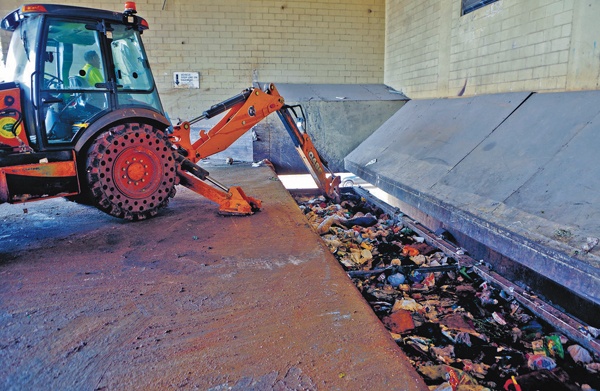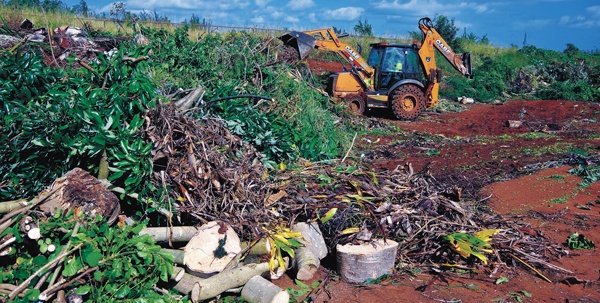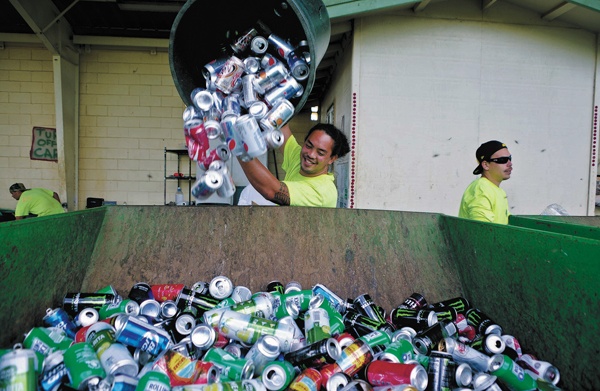Last year, 77,500 tons of trash were disposed of at the county’s Kekaha landfill. And that’s a problem. That landfill is near capacity and will eventually have to be closed. The best way to extend its life is to reduce
Last year, 77,500 tons of trash were disposed of at the county’s Kekaha landfill.
And that’s a problem.
That landfill is near capacity and will eventually have to be closed. The best way to extend its life is to reduce the amount of waste, an average of 210 tons a day, being delivered there. The county of Kauai has a plan.
“A lot of what’s generated can be recycled,” said Allison Fraley, solid waste program development coordinator.
Recycling and waste diversion are key points in two pieces of legislation being proposed by the Solid Waste Division.
One would require businesses to implement recycling programs that would capture and divert designated recyclables — paper, cardboard, scrap metal and greenwaste —from disposal.
“It’s materials that are easy to recycle,” Fraley said.
The other would require construction and demolition projects to divert 95 percent of designated recyclable materials during the course of the job.
The county believes there is support for the ordinances.
“We know that visitors and customers really do value recycling,” she said during a presentation at the Lihue Business Association.
The county estimates that as much as 55 percent of Kauai’s waste stream is generated by businesses. The proposed ordinances would reinforce existing restrictions on the disposal of commercially generated cardboard, metal and green waste.
They would apply to businesses, governmental agencies, institutions and multi-family residences that generate at least three cubic yards of waste per week. They would have to subscribe to a recycling collection service or self-haul the materials to a permitted recycling facility and submit an annual report to the county.
The ordinance would require businesses to separate and recycle designated recyclables that have local processing capacity and developed markets.
Food and beverage establishments would have the additional requirement of recycling glass, aluminum and plastic HI5 containers.
It is anticipated the two ordinances combined would divert an additional 12,000 tons of waste from the landfill each year.
“Businesses can’t just dispose of that stuff anymore,” Fraley said.
And perhaps, save businesses money, too.
“In many instances the ordinances are expected to assist businesses in reducing costs since most materials are less expensive to recycle,” according to a county press release.
The proposed laws are being reviewed by the council, with final passage expected in March. Businesses would receive education and assistance on how to initiate the recycling programs from April to December. The laws would be enforced starting Jan. 1.
“We want to get people where they need to be with compliance,” Fraley said.
Those who fail to comply would be subject to penalties up to $500.
There can be exemptions for businesses that generate small amounts of waste and recyclables, or if the owner can demonstrate that “due to lack of space, or adequate access that compliance would result in violation of law.”
“It may be difficult for everyone to comply, “Fraley said.
Katherine Muzik, who listened to Fraley’s presentation, said people must do more to recycle.
“What we do on land is extremely important for both ourselves and the creatures in the sea,” she said.
The county will need to get word out about the proposed regulations and why they’re needed, she added.
“I wish more people paid more attention,” Muzik said. “Understanding the process, getting more education out there, is vital.”
Marg Dente, Kapaa resident, said she worked for a business that tossed out “an unbelievable amount of useable items.”
She also said key will be letting people know about the expense of landfills and why it’s critical to reduce the amount of waste going in them.
“It’s making people aware of how much space they occupy on this planet, and the rent we all need to pay,” she said.
To offer feedback, contact Fraley, 241-4837 or afraley@kauai.gov




